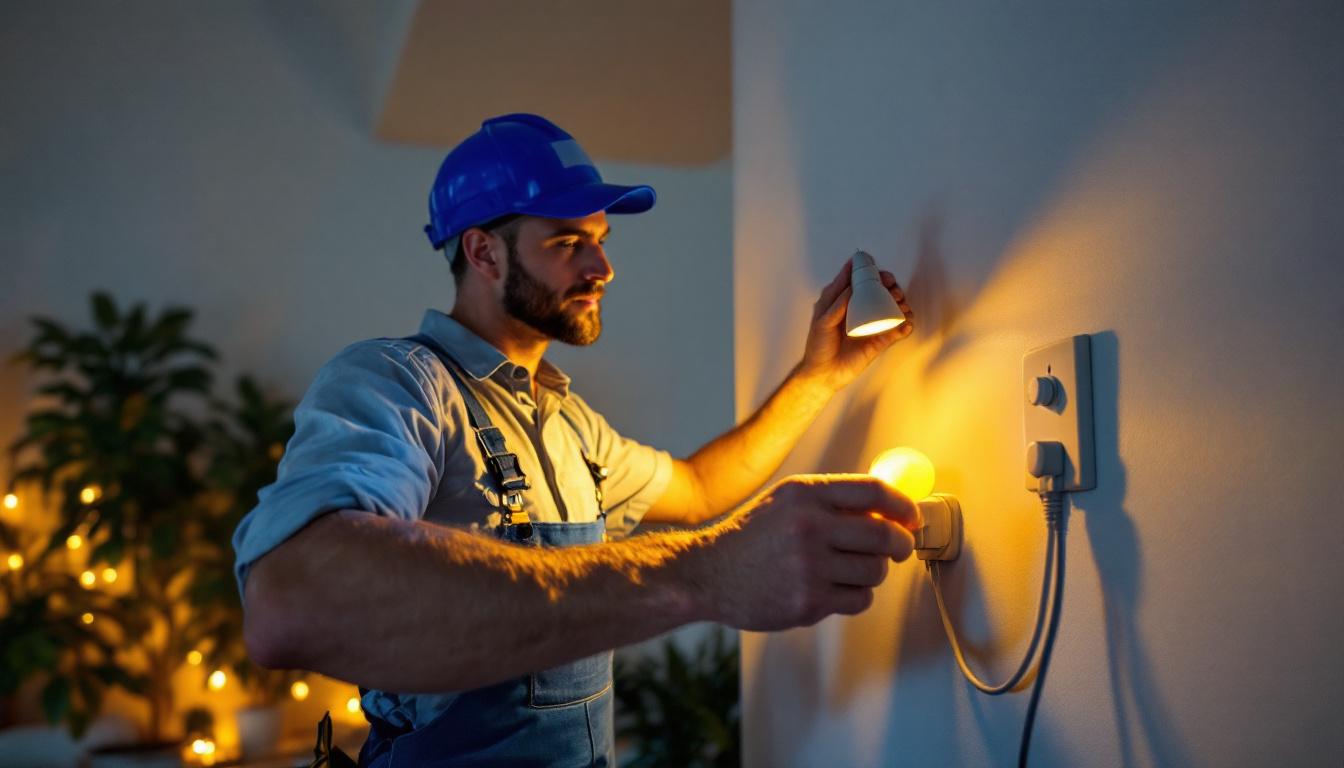
As the demand for sustainable solutions continues to rise, solar lighting has emerged as a viable option for both residential and commercial applications. Lighting contractors play a crucial role in this transition, as they are the ones who design, install, and maintain these systems. Understanding the intricacies of solar light technology is essential for contractors looking to expand their services and provide clients with innovative, eco-friendly options. This article delves into the key aspects of solar lighting systems that every lighting contractor should be familiar with.
Solar lighting systems harness energy from the sun to provide illumination. These systems consist of solar panels, batteries, LED lights, and controllers. The solar panels capture sunlight and convert it into electricity, which is stored in batteries for use during the night or on cloudy days. This technology not only reduces energy costs but also minimizes the carbon footprint associated with traditional lighting methods. Furthermore, solar lighting can be particularly beneficial in remote areas where access to the electrical grid is limited or non-existent, making it a versatile solution for various applications.
To effectively design and install solar lighting solutions, contractors must understand the main components involved:
Lighting contractors should be aware of the various types of solar lighting solutions available in the market:
Adopting solar lighting solutions offers numerous advantages for both contractors and clients. Understanding these benefits can help contractors effectively market their services.
One of the most compelling reasons to choose solar lighting is cost savings. Although the initial investment may be higher than traditional lighting systems, the long-term savings on electricity bills and maintenance costs can be significant. Additionally, many regions offer incentives and rebates for solar installations, further offsetting costs. Moreover, as technology advances, the price of solar panels and associated equipment continues to decline, making solar lighting an increasingly accessible option for a wider range of projects. This trend not only enhances the appeal of solar solutions but also encourages clients to consider them as a viable alternative to conventional lighting.
Solar lighting systems contribute to a reduction in greenhouse gas emissions by utilizing renewable energy sources. By promoting solar solutions, contractors can help clients reduce their carbon footprint, making a positive impact on the environment. This aligns with the growing consumer preference for sustainable practices. Furthermore, solar lighting can play a crucial role in preserving local ecosystems. By minimizing reliance on fossil fuels, solar installations help to decrease air and water pollution, fostering a healthier environment for both wildlife and communities. As awareness of climate change grows, clients are increasingly motivated to invest in solutions that reflect their commitment to sustainability.
Solar lighting systems typically require minimal maintenance. With no wiring and fewer moving parts, the risk of failure is reduced. Regular cleaning of the solar panels and occasional battery checks are usually all that is needed to ensure optimal performance. This ease of maintenance not only saves time and resources for clients but also enhances the overall lifespan of the lighting systems. In many cases, solar lights are designed to withstand harsh weather conditions, making them a reliable choice for various environments. As a result, contractors can confidently recommend solar lighting as a long-lasting solution that meets the needs of their clients without the hassle of frequent repairs or replacements.
When installing solar lighting systems, several factors must be considered to ensure optimal performance and client satisfaction.
A thorough site assessment is crucial before installation. Contractors should evaluate the location for sunlight exposure, shading from trees or buildings, and the overall landscape. Understanding these factors will help determine the appropriate type and number of solar lights needed for effective illumination.
The choice of battery can significantly impact the performance of a solar lighting system. Lithium-ion batteries are popular due to their high energy density and long lifespan. However, lead-acid batteries are also commonly used and can be more cost-effective. Contractors should consider the specific needs of the installation when selecting batteries.
It is essential for contractors to be aware of local regulations and codes related to solar installations. Compliance with these guidelines ensures that the installation meets safety and performance standards. This knowledge also helps in avoiding potential legal issues down the line.
While solar lighting offers numerous benefits, contractors may encounter challenges during installation. Being prepared for these challenges can lead to smoother project execution.
Weather conditions can affect the performance of solar lighting systems. Extended periods of cloudy weather may result in reduced energy generation, impacting the system’s ability to provide adequate illumination. Contractors should educate clients on the limitations of solar lighting and discuss potential solutions, such as integrating grid power for backup.
The upfront cost of solar lighting systems can be a barrier for some clients. Contractors should be prepared to explain the long-term savings and environmental benefits to help clients see the value in their investment. Providing financing options or information about available incentives can also help alleviate concerns about initial costs.
The solar lighting industry is constantly evolving, with new technologies emerging regularly. Keeping up with these advancements is essential for contractors to remain competitive. Investing in ongoing education and training can help contractors stay informed about the latest products and installation techniques.
Effectively marketing solar lighting services can help contractors attract new clients and grow their business. Here are some strategies to consider.
When promoting solar lighting services, it’s essential to emphasize the benefits, such as cost savings, environmental impact, and low maintenance requirements. Creating informative content, such as blog posts or brochures, can help educate potential clients about the advantages of solar lighting.
Displaying completed solar lighting projects can serve as a powerful marketing tool. High-quality photos and testimonials from satisfied clients can build trust and credibility. Consider creating a portfolio on the company website or sharing project highlights on social media platforms.
Building relationships with other professionals in the industry can lead to valuable referrals. Networking with architects, landscape designers, and builders can help contractors gain access to new projects and clients. Additionally, partnering with solar manufacturers can provide exclusive access to products and training resources.
The solar lighting industry is poised for growth, with several trends expected to shape its future. Contractors should stay informed about these trends to remain competitive and meet client demands.
As technology advances, smart solar lighting systems are becoming increasingly popular. These systems can be controlled remotely, allowing users to adjust brightness levels, set timers, and monitor energy usage. Integrating smart technology can enhance the appeal of solar lighting solutions for tech-savvy clients.
With the rise of smart city initiatives, solar lighting is being integrated into urban planning. This trend presents opportunities for contractors to collaborate with municipalities and contribute to sustainable city development. Understanding the requirements and goals of smart city projects can help contractors position themselves as valuable partners.
Ongoing research and development in solar technology are leading to more efficient solar panels and lighting fixtures. As these advancements become available, contractors should be prepared to adapt their offerings to include the latest products, ensuring they provide clients with the best possible solutions.
Solar lighting represents a significant opportunity for lighting contractors to expand their services and contribute to a more sustainable future. By understanding the technology, benefits, challenges, and trends associated with solar lighting, contractors can position themselves as knowledgeable professionals in this growing field. As more clients seek eco-friendly solutions, being well-versed in solar lighting will not only enhance a contractor’s reputation but also drive business growth.
Incorporating solar lighting into project offerings can lead to increased client satisfaction and loyalty. By staying informed and adaptable, lighting contractors can thrive in an ever-evolving industry, paving the way for a brighter, greener future.
Ready to harness the power of solar lighting and elevate your lighting projects? At LumenWholesale, we provide lighting contractors with the highest quality, spec-grade solar lighting products at unbeatable wholesale prices. Say goodbye to local distributor markups and hello to superior lighting solutions that meet the strictest industry standards. With our commitment to affordability and convenience, you can enjoy bulk buying with free shipping, ensuring you get the best value without any hidden fees. Take the next step in sustainable lighting and explore our wholesale lighting options today to bring unparalleled quality and efficiency to your clients.

Discover essential tips and insights for lighting contractors in our comprehensive guide to house outdoor lighting.

Discover essential insights and expert tips for lighting contractors on installing plug-in can lights.

Discover the essential guide for lighting contractors with Maxfan.

Discover effective strategies for training your team in the use of commercial grow lights to maximize plant growth and productivity.